Child Protection and Domestic Violence Acts in Northern Territory
VerifiedAdded on 2023/06/12
|12
|3295
|256
AI Summary
This essay discusses the primary role of a child protection officer in ensuring protection to children subjected to any form of abuse within the Northern territory with respect to children in Darwin. The paper also highlights the strengths and shortcomings that are associated with the legislation in ensuring protection to children being subjected to domestic violence in Darwin.
Contribute Materials
Your contribution can guide someone’s learning journey. Share your
documents today.
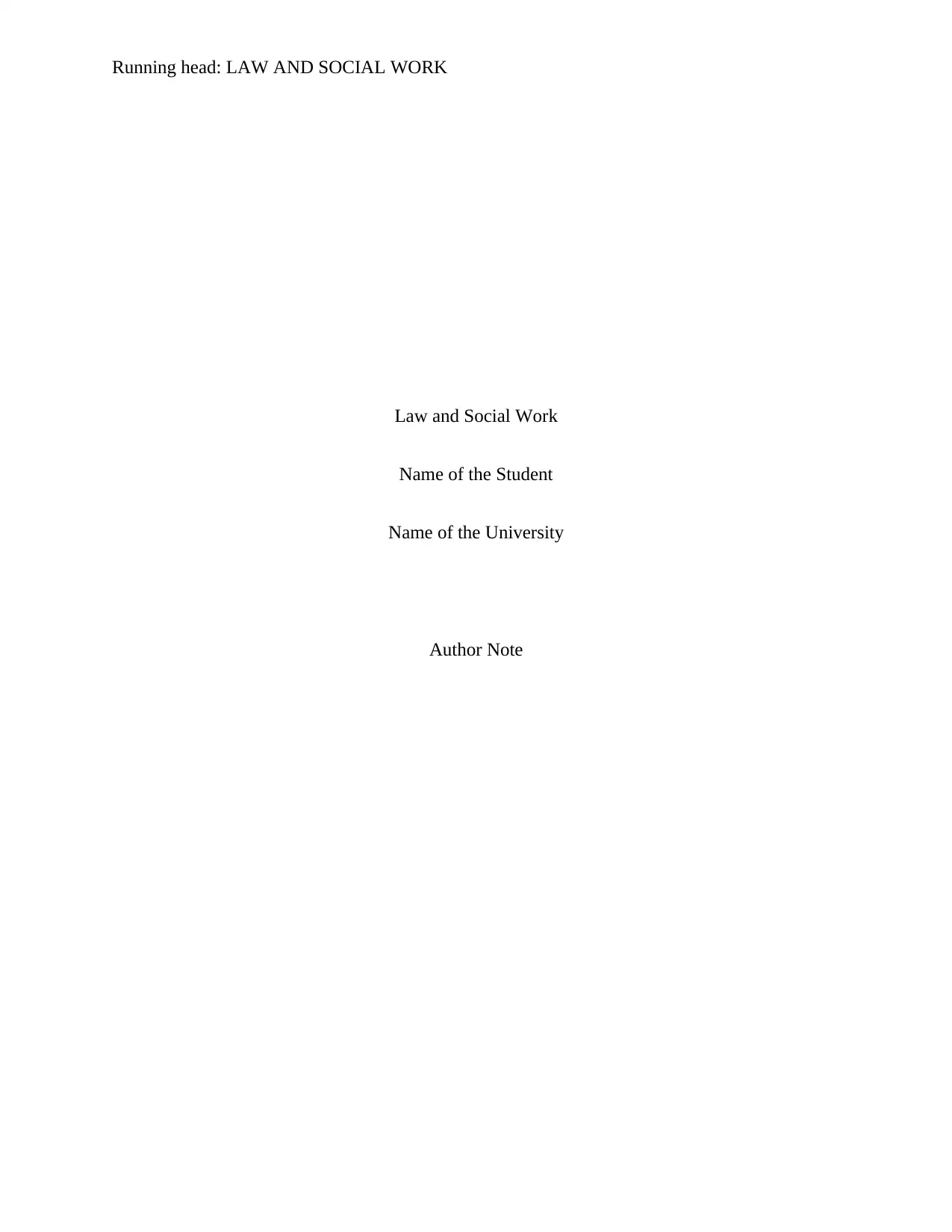
Running head: LAW AND SOCIAL WORK
Law and Social Work
Name of the Student
Name of the University
Author Note
Law and Social Work
Name of the Student
Name of the University
Author Note
Secure Best Marks with AI Grader
Need help grading? Try our AI Grader for instant feedback on your assignments.
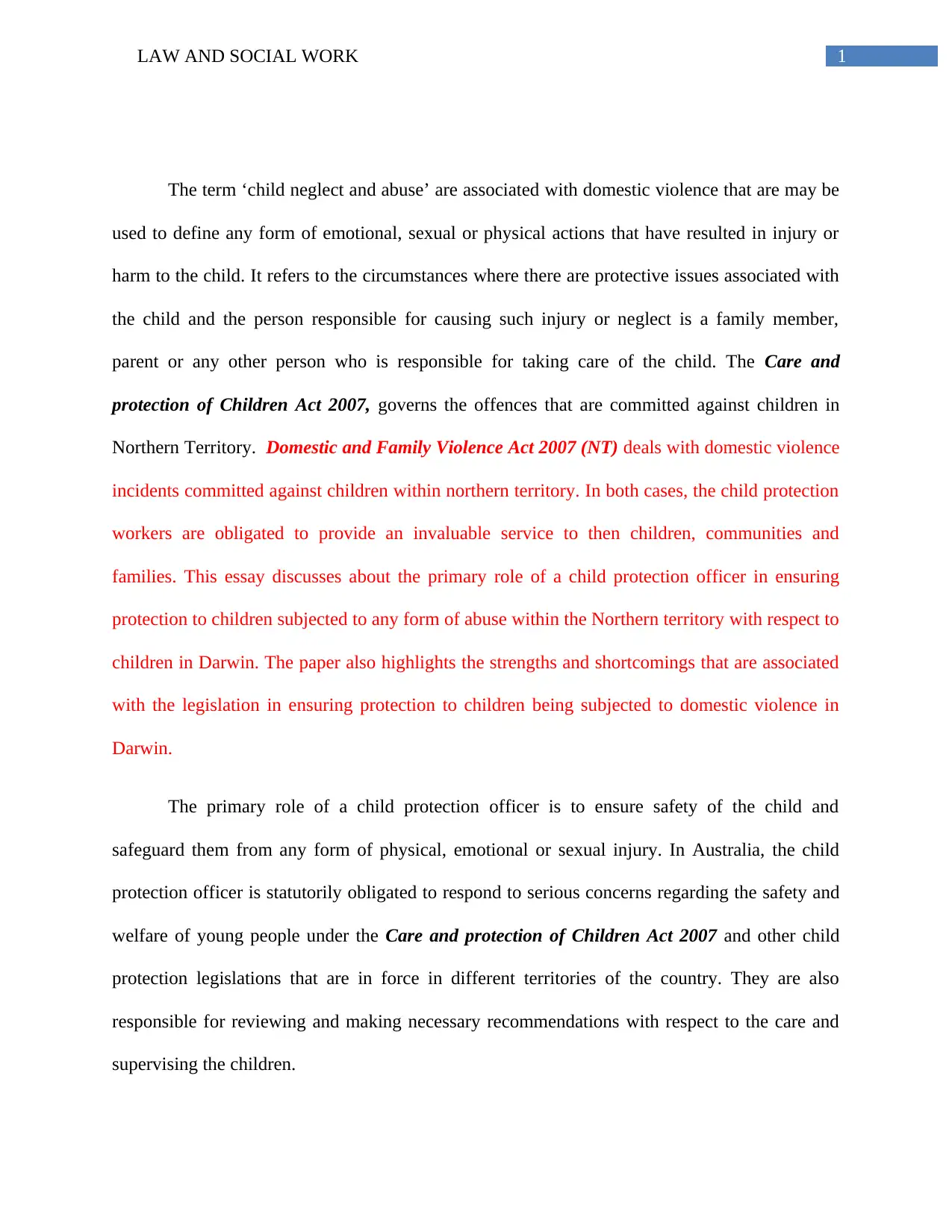
1LAW AND SOCIAL WORK
The term ‘child neglect and abuse’ are associated with domestic violence that are may be
used to define any form of emotional, sexual or physical actions that have resulted in injury or
harm to the child. It refers to the circumstances where there are protective issues associated with
the child and the person responsible for causing such injury or neglect is a family member,
parent or any other person who is responsible for taking care of the child. The Care and
protection of Children Act 2007, governs the offences that are committed against children in
Northern Territory. Domestic and Family Violence Act 2007 (NT) deals with domestic violence
incidents committed against children within northern territory. In both cases, the child protection
workers are obligated to provide an invaluable service to then children, communities and
families. This essay discusses about the primary role of a child protection officer in ensuring
protection to children subjected to any form of abuse within the Northern territory with respect to
children in Darwin. The paper also highlights the strengths and shortcomings that are associated
with the legislation in ensuring protection to children being subjected to domestic violence in
Darwin.
The primary role of a child protection officer is to ensure safety of the child and
safeguard them from any form of physical, emotional or sexual injury. In Australia, the child
protection officer is statutorily obligated to respond to serious concerns regarding the safety and
welfare of young people under the Care and protection of Children Act 2007 and other child
protection legislations that are in force in different territories of the country. They are also
responsible for reviewing and making necessary recommendations with respect to the care and
supervising the children.
The term ‘child neglect and abuse’ are associated with domestic violence that are may be
used to define any form of emotional, sexual or physical actions that have resulted in injury or
harm to the child. It refers to the circumstances where there are protective issues associated with
the child and the person responsible for causing such injury or neglect is a family member,
parent or any other person who is responsible for taking care of the child. The Care and
protection of Children Act 2007, governs the offences that are committed against children in
Northern Territory. Domestic and Family Violence Act 2007 (NT) deals with domestic violence
incidents committed against children within northern territory. In both cases, the child protection
workers are obligated to provide an invaluable service to then children, communities and
families. This essay discusses about the primary role of a child protection officer in ensuring
protection to children subjected to any form of abuse within the Northern territory with respect to
children in Darwin. The paper also highlights the strengths and shortcomings that are associated
with the legislation in ensuring protection to children being subjected to domestic violence in
Darwin.
The primary role of a child protection officer is to ensure safety of the child and
safeguard them from any form of physical, emotional or sexual injury. In Australia, the child
protection officer is statutorily obligated to respond to serious concerns regarding the safety and
welfare of young people under the Care and protection of Children Act 2007 and other child
protection legislations that are in force in different territories of the country. They are also
responsible for reviewing and making necessary recommendations with respect to the care and
supervising the children.
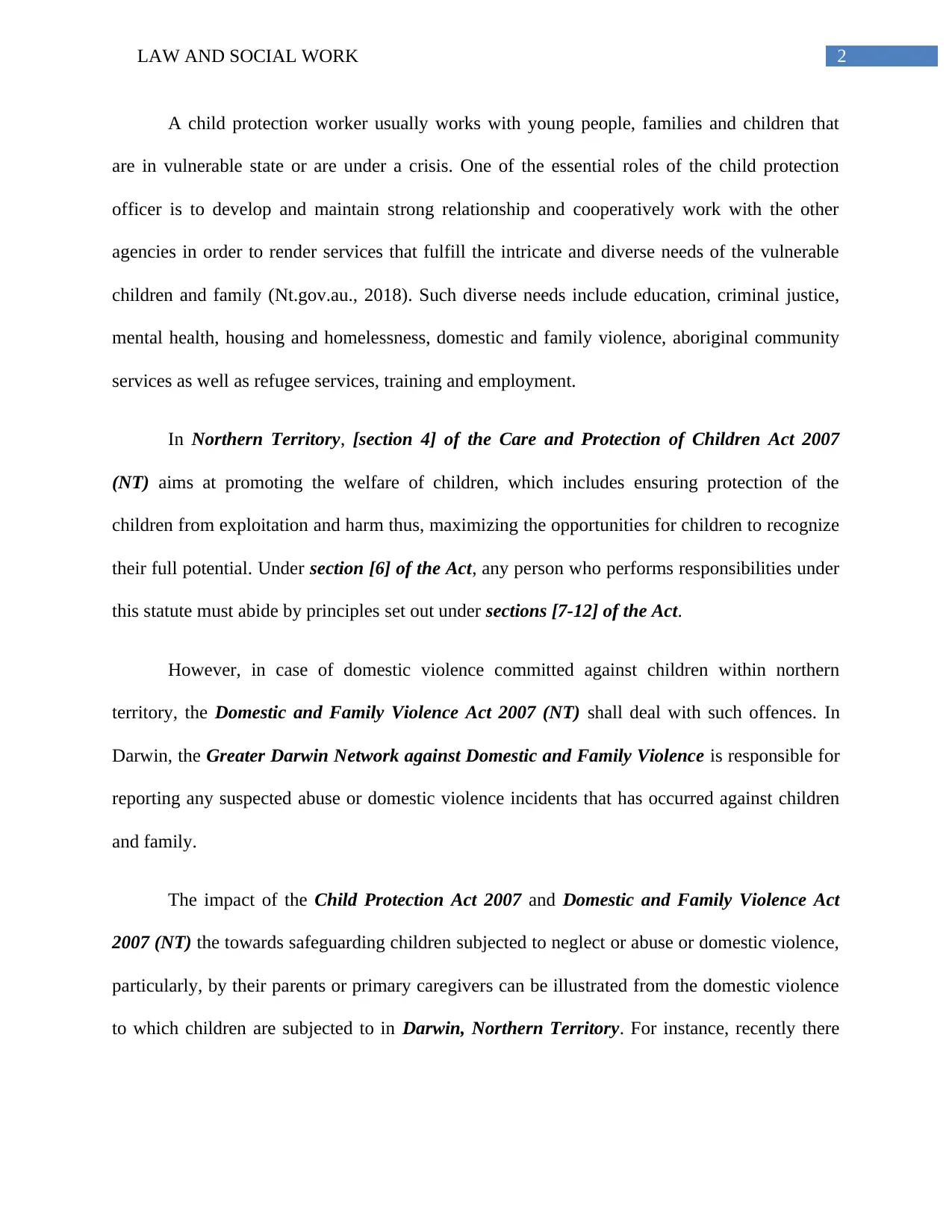
2LAW AND SOCIAL WORK
A child protection worker usually works with young people, families and children that
are in vulnerable state or are under a crisis. One of the essential roles of the child protection
officer is to develop and maintain strong relationship and cooperatively work with the other
agencies in order to render services that fulfill the intricate and diverse needs of the vulnerable
children and family (Nt.gov.au., 2018). Such diverse needs include education, criminal justice,
mental health, housing and homelessness, domestic and family violence, aboriginal community
services as well as refugee services, training and employment.
In Northern Territory, [section 4] of the Care and Protection of Children Act 2007
(NT) aims at promoting the welfare of children, which includes ensuring protection of the
children from exploitation and harm thus, maximizing the opportunities for children to recognize
their full potential. Under section [6] of the Act, any person who performs responsibilities under
this statute must abide by principles set out under sections [7-12] of the Act.
However, in case of domestic violence committed against children within northern
territory, the Domestic and Family Violence Act 2007 (NT) shall deal with such offences. In
Darwin, the Greater Darwin Network against Domestic and Family Violence is responsible for
reporting any suspected abuse or domestic violence incidents that has occurred against children
and family.
The impact of the Child Protection Act 2007 and Domestic and Family Violence Act
2007 (NT) the towards safeguarding children subjected to neglect or abuse or domestic violence,
particularly, by their parents or primary caregivers can be illustrated from the domestic violence
to which children are subjected to in Darwin, Northern Territory. For instance, recently there
A child protection worker usually works with young people, families and children that
are in vulnerable state or are under a crisis. One of the essential roles of the child protection
officer is to develop and maintain strong relationship and cooperatively work with the other
agencies in order to render services that fulfill the intricate and diverse needs of the vulnerable
children and family (Nt.gov.au., 2018). Such diverse needs include education, criminal justice,
mental health, housing and homelessness, domestic and family violence, aboriginal community
services as well as refugee services, training and employment.
In Northern Territory, [section 4] of the Care and Protection of Children Act 2007
(NT) aims at promoting the welfare of children, which includes ensuring protection of the
children from exploitation and harm thus, maximizing the opportunities for children to recognize
their full potential. Under section [6] of the Act, any person who performs responsibilities under
this statute must abide by principles set out under sections [7-12] of the Act.
However, in case of domestic violence committed against children within northern
territory, the Domestic and Family Violence Act 2007 (NT) shall deal with such offences. In
Darwin, the Greater Darwin Network against Domestic and Family Violence is responsible for
reporting any suspected abuse or domestic violence incidents that has occurred against children
and family.
The impact of the Child Protection Act 2007 and Domestic and Family Violence Act
2007 (NT) the towards safeguarding children subjected to neglect or abuse or domestic violence,
particularly, by their parents or primary caregivers can be illustrated from the domestic violence
to which children are subjected to in Darwin, Northern Territory. For instance, recently there
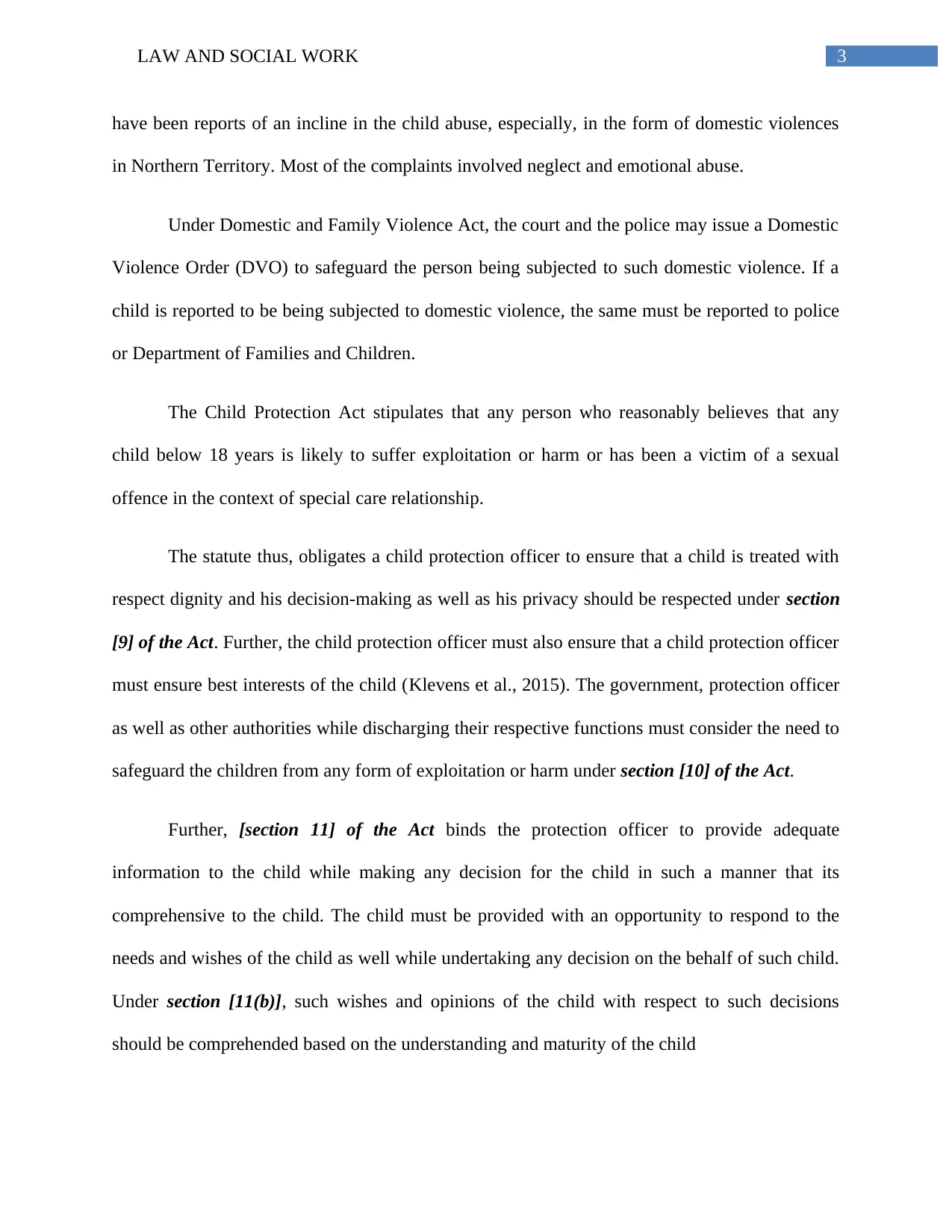
3LAW AND SOCIAL WORK
have been reports of an incline in the child abuse, especially, in the form of domestic violences
in Northern Territory. Most of the complaints involved neglect and emotional abuse.
Under Domestic and Family Violence Act, the court and the police may issue a Domestic
Violence Order (DVO) to safeguard the person being subjected to such domestic violence. If a
child is reported to be being subjected to domestic violence, the same must be reported to police
or Department of Families and Children.
The Child Protection Act stipulates that any person who reasonably believes that any
child below 18 years is likely to suffer exploitation or harm or has been a victim of a sexual
offence in the context of special care relationship.
The statute thus, obligates a child protection officer to ensure that a child is treated with
respect dignity and his decision-making as well as his privacy should be respected under section
[9] of the Act. Further, the child protection officer must also ensure that a child protection officer
must ensure best interests of the child (Klevens et al., 2015). The government, protection officer
as well as other authorities while discharging their respective functions must consider the need to
safeguard the children from any form of exploitation or harm under section [10] of the Act.
Further, [section 11] of the Act binds the protection officer to provide adequate
information to the child while making any decision for the child in such a manner that its
comprehensive to the child. The child must be provided with an opportunity to respond to the
needs and wishes of the child as well while undertaking any decision on the behalf of such child.
Under section [11(b)], such wishes and opinions of the child with respect to such decisions
should be comprehended based on the understanding and maturity of the child
have been reports of an incline in the child abuse, especially, in the form of domestic violences
in Northern Territory. Most of the complaints involved neglect and emotional abuse.
Under Domestic and Family Violence Act, the court and the police may issue a Domestic
Violence Order (DVO) to safeguard the person being subjected to such domestic violence. If a
child is reported to be being subjected to domestic violence, the same must be reported to police
or Department of Families and Children.
The Child Protection Act stipulates that any person who reasonably believes that any
child below 18 years is likely to suffer exploitation or harm or has been a victim of a sexual
offence in the context of special care relationship.
The statute thus, obligates a child protection officer to ensure that a child is treated with
respect dignity and his decision-making as well as his privacy should be respected under section
[9] of the Act. Further, the child protection officer must also ensure that a child protection officer
must ensure best interests of the child (Klevens et al., 2015). The government, protection officer
as well as other authorities while discharging their respective functions must consider the need to
safeguard the children from any form of exploitation or harm under section [10] of the Act.
Further, [section 11] of the Act binds the protection officer to provide adequate
information to the child while making any decision for the child in such a manner that its
comprehensive to the child. The child must be provided with an opportunity to respond to the
needs and wishes of the child as well while undertaking any decision on the behalf of such child.
Under section [11(b)], such wishes and opinions of the child with respect to such decisions
should be comprehended based on the understanding and maturity of the child
Secure Best Marks with AI Grader
Need help grading? Try our AI Grader for instant feedback on your assignments.
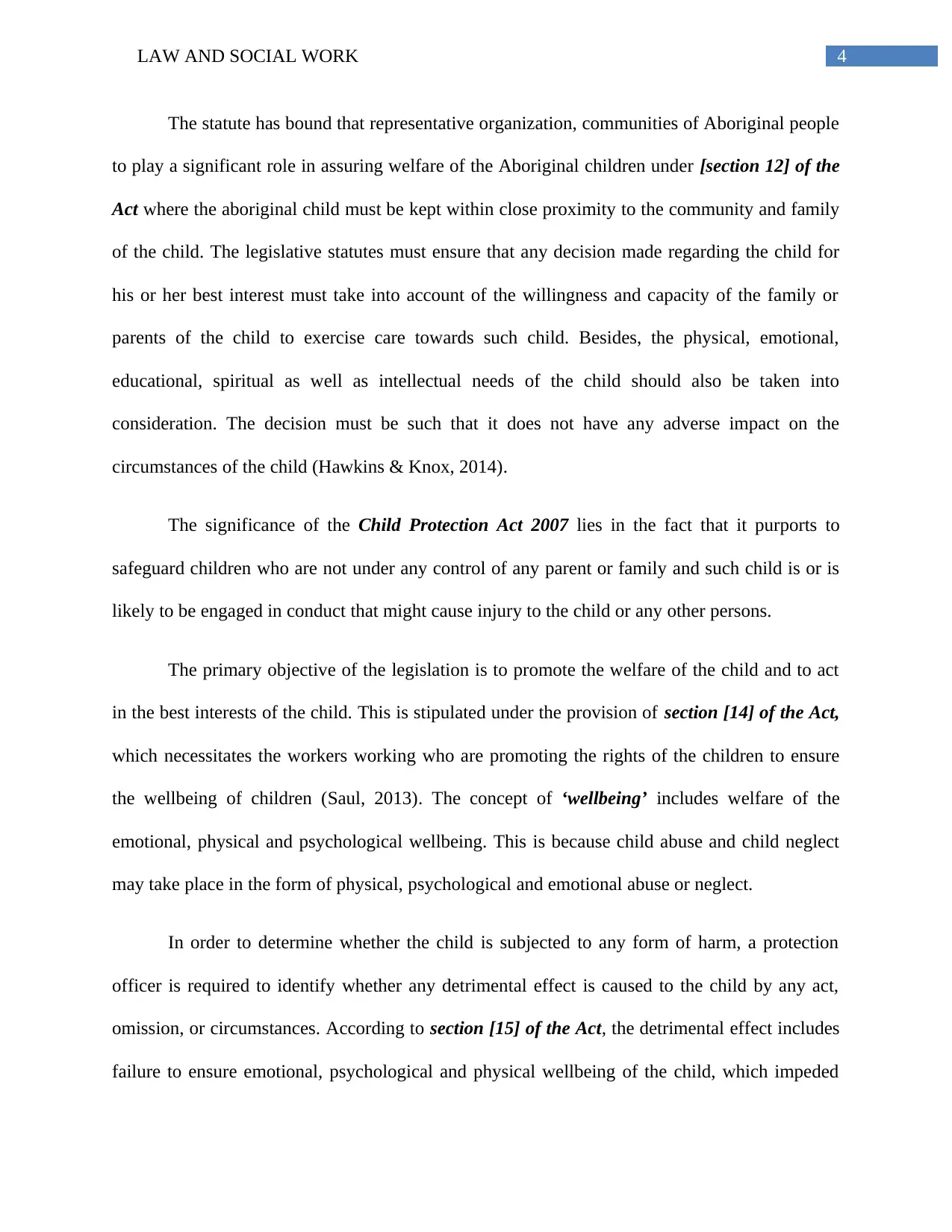
4LAW AND SOCIAL WORK
The statute has bound that representative organization, communities of Aboriginal people
to play a significant role in assuring welfare of the Aboriginal children under [section 12] of the
Act where the aboriginal child must be kept within close proximity to the community and family
of the child. The legislative statutes must ensure that any decision made regarding the child for
his or her best interest must take into account of the willingness and capacity of the family or
parents of the child to exercise care towards such child. Besides, the physical, emotional,
educational, spiritual as well as intellectual needs of the child should also be taken into
consideration. The decision must be such that it does not have any adverse impact on the
circumstances of the child (Hawkins & Knox, 2014).
The significance of the Child Protection Act 2007 lies in the fact that it purports to
safeguard children who are not under any control of any parent or family and such child is or is
likely to be engaged in conduct that might cause injury to the child or any other persons.
The primary objective of the legislation is to promote the welfare of the child and to act
in the best interests of the child. This is stipulated under the provision of section [14] of the Act,
which necessitates the workers working who are promoting the rights of the children to ensure
the wellbeing of children (Saul, 2013). The concept of ‘wellbeing’ includes welfare of the
emotional, physical and psychological wellbeing. This is because child abuse and child neglect
may take place in the form of physical, psychological and emotional abuse or neglect.
In order to determine whether the child is subjected to any form of harm, a protection
officer is required to identify whether any detrimental effect is caused to the child by any act,
omission, or circumstances. According to section [15] of the Act, the detrimental effect includes
failure to ensure emotional, psychological and physical wellbeing of the child, which impeded
The statute has bound that representative organization, communities of Aboriginal people
to play a significant role in assuring welfare of the Aboriginal children under [section 12] of the
Act where the aboriginal child must be kept within close proximity to the community and family
of the child. The legislative statutes must ensure that any decision made regarding the child for
his or her best interest must take into account of the willingness and capacity of the family or
parents of the child to exercise care towards such child. Besides, the physical, emotional,
educational, spiritual as well as intellectual needs of the child should also be taken into
consideration. The decision must be such that it does not have any adverse impact on the
circumstances of the child (Hawkins & Knox, 2014).
The significance of the Child Protection Act 2007 lies in the fact that it purports to
safeguard children who are not under any control of any parent or family and such child is or is
likely to be engaged in conduct that might cause injury to the child or any other persons.
The primary objective of the legislation is to promote the welfare of the child and to act
in the best interests of the child. This is stipulated under the provision of section [14] of the Act,
which necessitates the workers working who are promoting the rights of the children to ensure
the wellbeing of children (Saul, 2013). The concept of ‘wellbeing’ includes welfare of the
emotional, physical and psychological wellbeing. This is because child abuse and child neglect
may take place in the form of physical, psychological and emotional abuse or neglect.
In order to determine whether the child is subjected to any form of harm, a protection
officer is required to identify whether any detrimental effect is caused to the child by any act,
omission, or circumstances. According to section [15] of the Act, the detrimental effect includes
failure to ensure emotional, psychological and physical wellbeing of the child, which impeded
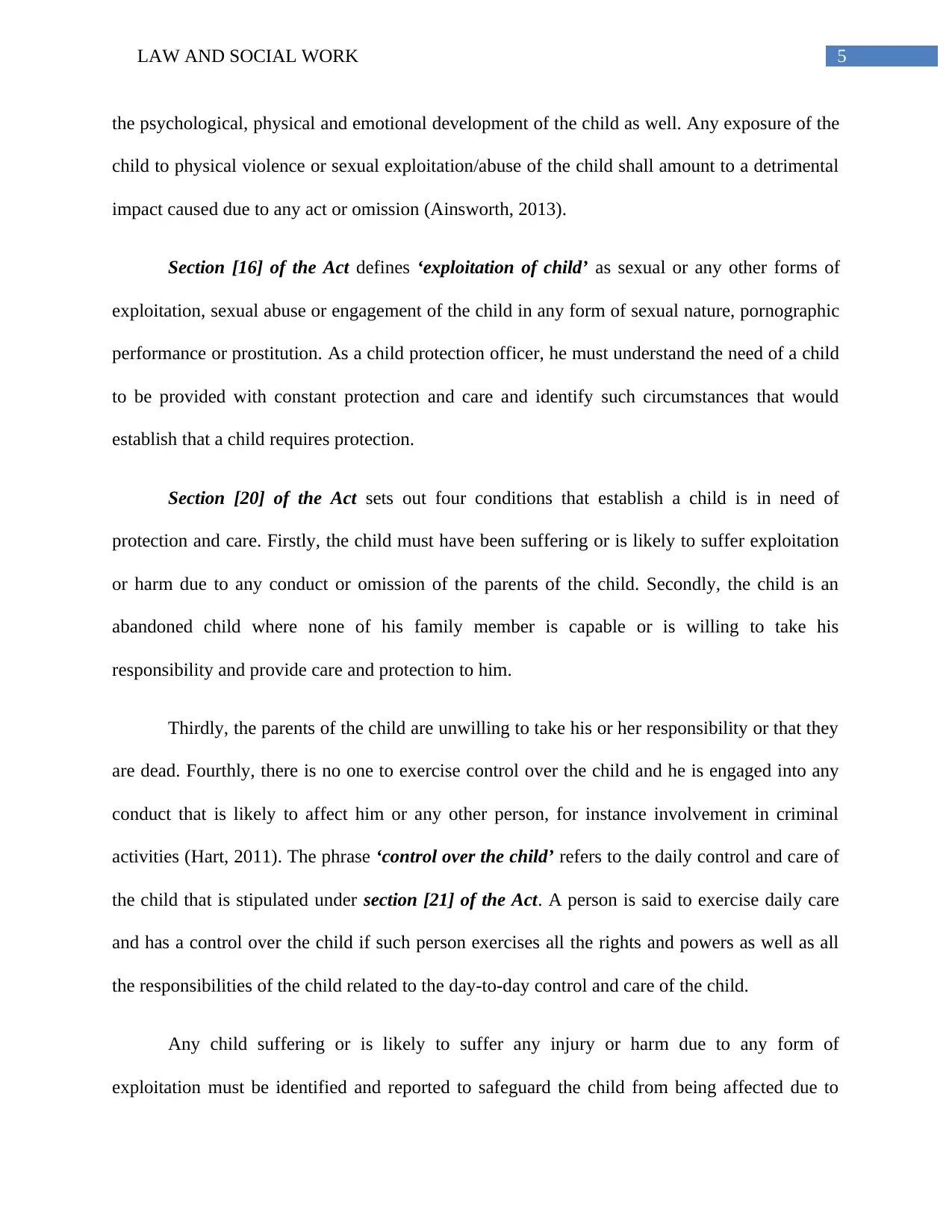
5LAW AND SOCIAL WORK
the psychological, physical and emotional development of the child as well. Any exposure of the
child to physical violence or sexual exploitation/abuse of the child shall amount to a detrimental
impact caused due to any act or omission (Ainsworth, 2013).
Section [16] of the Act defines ‘exploitation of child’ as sexual or any other forms of
exploitation, sexual abuse or engagement of the child in any form of sexual nature, pornographic
performance or prostitution. As a child protection officer, he must understand the need of a child
to be provided with constant protection and care and identify such circumstances that would
establish that a child requires protection.
Section [20] of the Act sets out four conditions that establish a child is in need of
protection and care. Firstly, the child must have been suffering or is likely to suffer exploitation
or harm due to any conduct or omission of the parents of the child. Secondly, the child is an
abandoned child where none of his family member is capable or is willing to take his
responsibility and provide care and protection to him.
Thirdly, the parents of the child are unwilling to take his or her responsibility or that they
are dead. Fourthly, there is no one to exercise control over the child and he is engaged into any
conduct that is likely to affect him or any other person, for instance involvement in criminal
activities (Hart, 2011). The phrase ‘control over the child’ refers to the daily control and care of
the child that is stipulated under section [21] of the Act. A person is said to exercise daily care
and has a control over the child if such person exercises all the rights and powers as well as all
the responsibilities of the child related to the day-to-day control and care of the child.
Any child suffering or is likely to suffer any injury or harm due to any form of
exploitation must be identified and reported to safeguard the child from being affected due to
the psychological, physical and emotional development of the child as well. Any exposure of the
child to physical violence or sexual exploitation/abuse of the child shall amount to a detrimental
impact caused due to any act or omission (Ainsworth, 2013).
Section [16] of the Act defines ‘exploitation of child’ as sexual or any other forms of
exploitation, sexual abuse or engagement of the child in any form of sexual nature, pornographic
performance or prostitution. As a child protection officer, he must understand the need of a child
to be provided with constant protection and care and identify such circumstances that would
establish that a child requires protection.
Section [20] of the Act sets out four conditions that establish a child is in need of
protection and care. Firstly, the child must have been suffering or is likely to suffer exploitation
or harm due to any conduct or omission of the parents of the child. Secondly, the child is an
abandoned child where none of his family member is capable or is willing to take his
responsibility and provide care and protection to him.
Thirdly, the parents of the child are unwilling to take his or her responsibility or that they
are dead. Fourthly, there is no one to exercise control over the child and he is engaged into any
conduct that is likely to affect him or any other person, for instance involvement in criminal
activities (Hart, 2011). The phrase ‘control over the child’ refers to the daily control and care of
the child that is stipulated under section [21] of the Act. A person is said to exercise daily care
and has a control over the child if such person exercises all the rights and powers as well as all
the responsibilities of the child related to the day-to-day control and care of the child.
Any child suffering or is likely to suffer any injury or harm due to any form of
exploitation must be identified and reported to safeguard the child from being affected due to
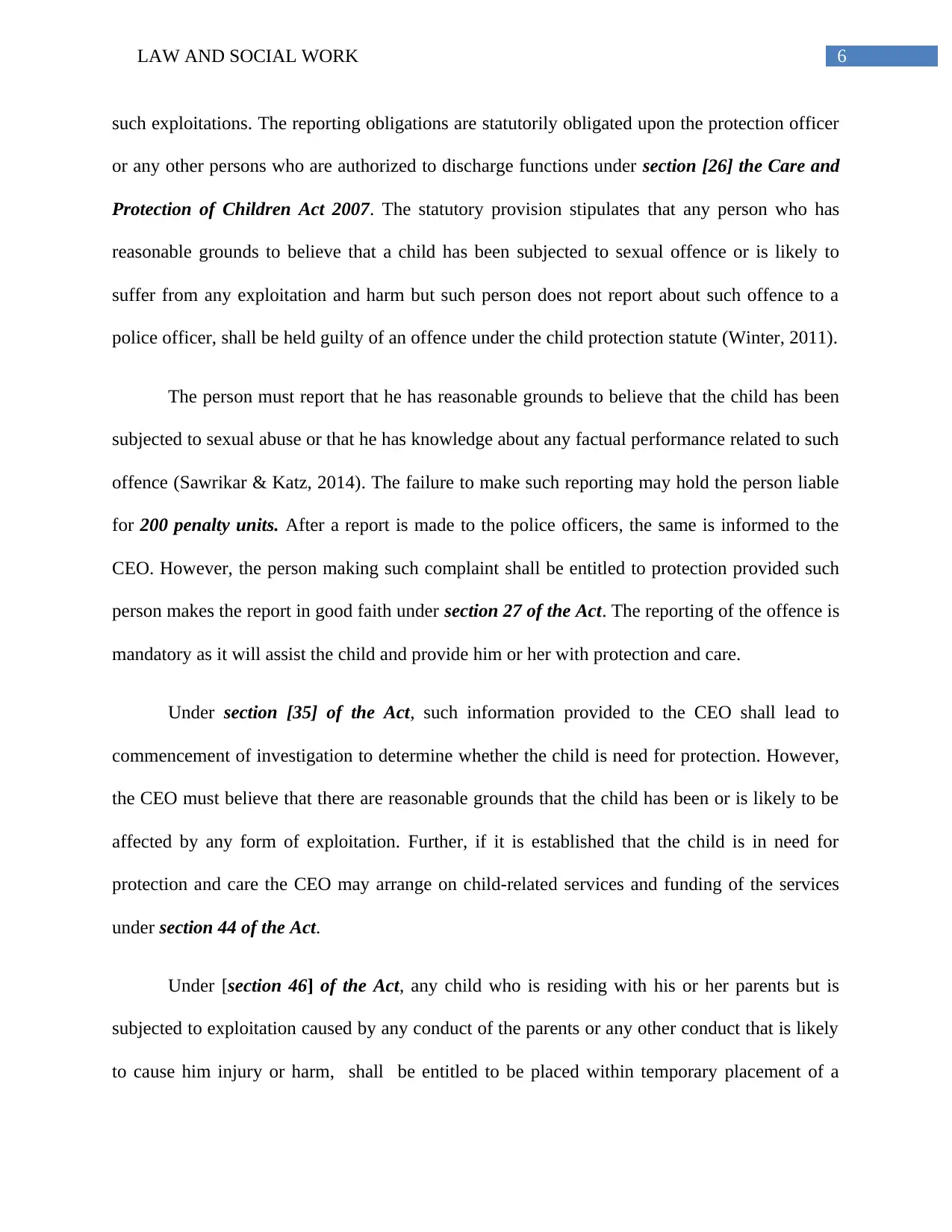
6LAW AND SOCIAL WORK
such exploitations. The reporting obligations are statutorily obligated upon the protection officer
or any other persons who are authorized to discharge functions under section [26] the Care and
Protection of Children Act 2007. The statutory provision stipulates that any person who has
reasonable grounds to believe that a child has been subjected to sexual offence or is likely to
suffer from any exploitation and harm but such person does not report about such offence to a
police officer, shall be held guilty of an offence under the child protection statute (Winter, 2011).
The person must report that he has reasonable grounds to believe that the child has been
subjected to sexual abuse or that he has knowledge about any factual performance related to such
offence (Sawrikar & Katz, 2014). The failure to make such reporting may hold the person liable
for 200 penalty units. After a report is made to the police officers, the same is informed to the
CEO. However, the person making such complaint shall be entitled to protection provided such
person makes the report in good faith under section 27 of the Act. The reporting of the offence is
mandatory as it will assist the child and provide him or her with protection and care.
Under section [35] of the Act, such information provided to the CEO shall lead to
commencement of investigation to determine whether the child is need for protection. However,
the CEO must believe that there are reasonable grounds that the child has been or is likely to be
affected by any form of exploitation. Further, if it is established that the child is in need for
protection and care the CEO may arrange on child-related services and funding of the services
under section 44 of the Act.
Under [section 46] of the Act, any child who is residing with his or her parents but is
subjected to exploitation caused by any conduct of the parents or any other conduct that is likely
to cause him injury or harm, shall be entitled to be placed within temporary placement of a
such exploitations. The reporting obligations are statutorily obligated upon the protection officer
or any other persons who are authorized to discharge functions under section [26] the Care and
Protection of Children Act 2007. The statutory provision stipulates that any person who has
reasonable grounds to believe that a child has been subjected to sexual offence or is likely to
suffer from any exploitation and harm but such person does not report about such offence to a
police officer, shall be held guilty of an offence under the child protection statute (Winter, 2011).
The person must report that he has reasonable grounds to believe that the child has been
subjected to sexual abuse or that he has knowledge about any factual performance related to such
offence (Sawrikar & Katz, 2014). The failure to make such reporting may hold the person liable
for 200 penalty units. After a report is made to the police officers, the same is informed to the
CEO. However, the person making such complaint shall be entitled to protection provided such
person makes the report in good faith under section 27 of the Act. The reporting of the offence is
mandatory as it will assist the child and provide him or her with protection and care.
Under section [35] of the Act, such information provided to the CEO shall lead to
commencement of investigation to determine whether the child is need for protection. However,
the CEO must believe that there are reasonable grounds that the child has been or is likely to be
affected by any form of exploitation. Further, if it is established that the child is in need for
protection and care the CEO may arrange on child-related services and funding of the services
under section 44 of the Act.
Under [section 46] of the Act, any child who is residing with his or her parents but is
subjected to exploitation caused by any conduct of the parents or any other conduct that is likely
to cause him injury or harm, shall be entitled to be placed within temporary placement of a
Paraphrase This Document
Need a fresh take? Get an instant paraphrase of this document with our AI Paraphraser
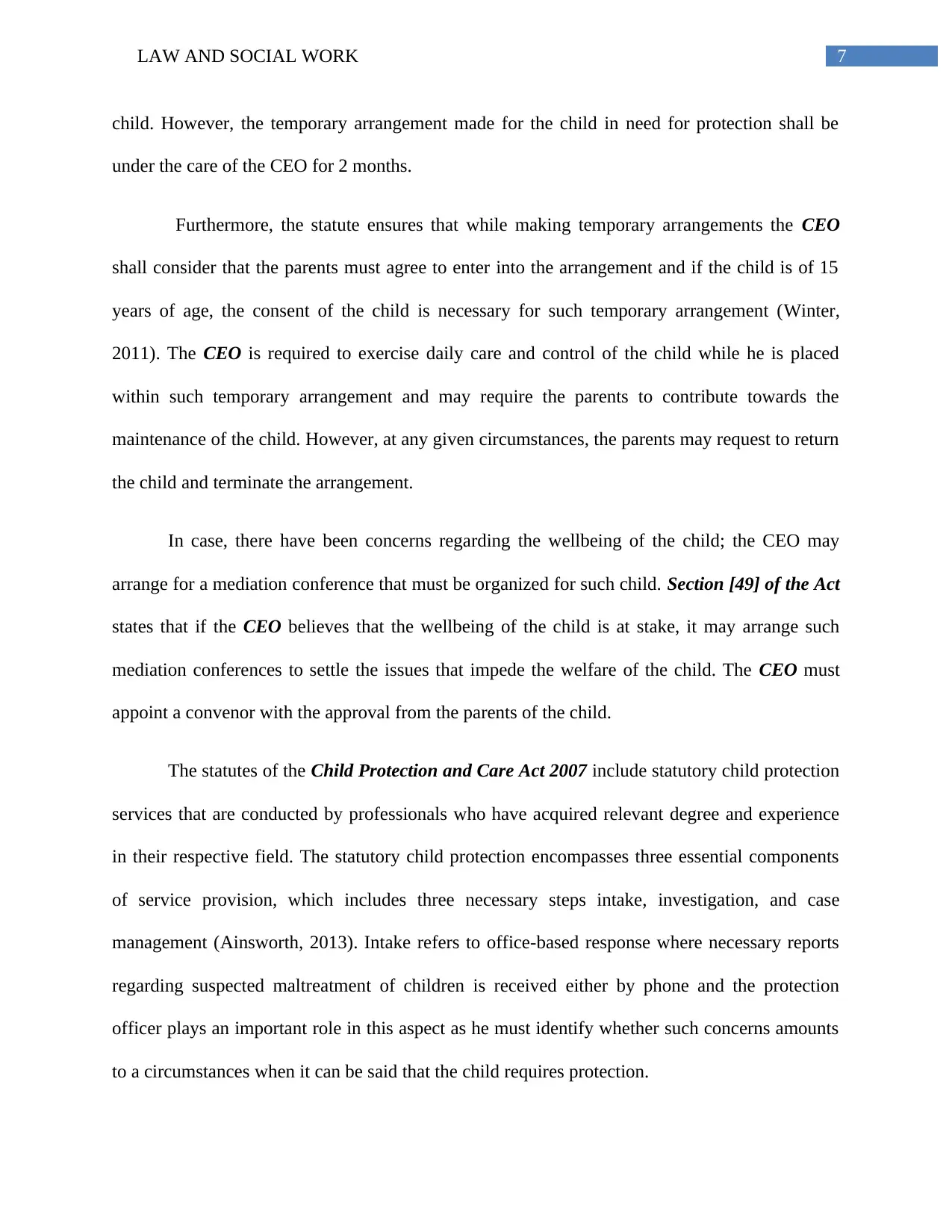
7LAW AND SOCIAL WORK
child. However, the temporary arrangement made for the child in need for protection shall be
under the care of the CEO for 2 months.
Furthermore, the statute ensures that while making temporary arrangements the CEO
shall consider that the parents must agree to enter into the arrangement and if the child is of 15
years of age, the consent of the child is necessary for such temporary arrangement (Winter,
2011). The CEO is required to exercise daily care and control of the child while he is placed
within such temporary arrangement and may require the parents to contribute towards the
maintenance of the child. However, at any given circumstances, the parents may request to return
the child and terminate the arrangement.
In case, there have been concerns regarding the wellbeing of the child; the CEO may
arrange for a mediation conference that must be organized for such child. Section [49] of the Act
states that if the CEO believes that the wellbeing of the child is at stake, it may arrange such
mediation conferences to settle the issues that impede the welfare of the child. The CEO must
appoint a convenor with the approval from the parents of the child.
The statutes of the Child Protection and Care Act 2007 include statutory child protection
services that are conducted by professionals who have acquired relevant degree and experience
in their respective field. The statutory child protection encompasses three essential components
of service provision, which includes three necessary steps intake, investigation, and case
management (Ainsworth, 2013). Intake refers to office-based response where necessary reports
regarding suspected maltreatment of children is received either by phone and the protection
officer plays an important role in this aspect as he must identify whether such concerns amounts
to a circumstances when it can be said that the child requires protection.
child. However, the temporary arrangement made for the child in need for protection shall be
under the care of the CEO for 2 months.
Furthermore, the statute ensures that while making temporary arrangements the CEO
shall consider that the parents must agree to enter into the arrangement and if the child is of 15
years of age, the consent of the child is necessary for such temporary arrangement (Winter,
2011). The CEO is required to exercise daily care and control of the child while he is placed
within such temporary arrangement and may require the parents to contribute towards the
maintenance of the child. However, at any given circumstances, the parents may request to return
the child and terminate the arrangement.
In case, there have been concerns regarding the wellbeing of the child; the CEO may
arrange for a mediation conference that must be organized for such child. Section [49] of the Act
states that if the CEO believes that the wellbeing of the child is at stake, it may arrange such
mediation conferences to settle the issues that impede the welfare of the child. The CEO must
appoint a convenor with the approval from the parents of the child.
The statutes of the Child Protection and Care Act 2007 include statutory child protection
services that are conducted by professionals who have acquired relevant degree and experience
in their respective field. The statutory child protection encompasses three essential components
of service provision, which includes three necessary steps intake, investigation, and case
management (Ainsworth, 2013). Intake refers to office-based response where necessary reports
regarding suspected maltreatment of children is received either by phone and the protection
officer plays an important role in this aspect as he must identify whether such concerns amounts
to a circumstances when it can be said that the child requires protection.
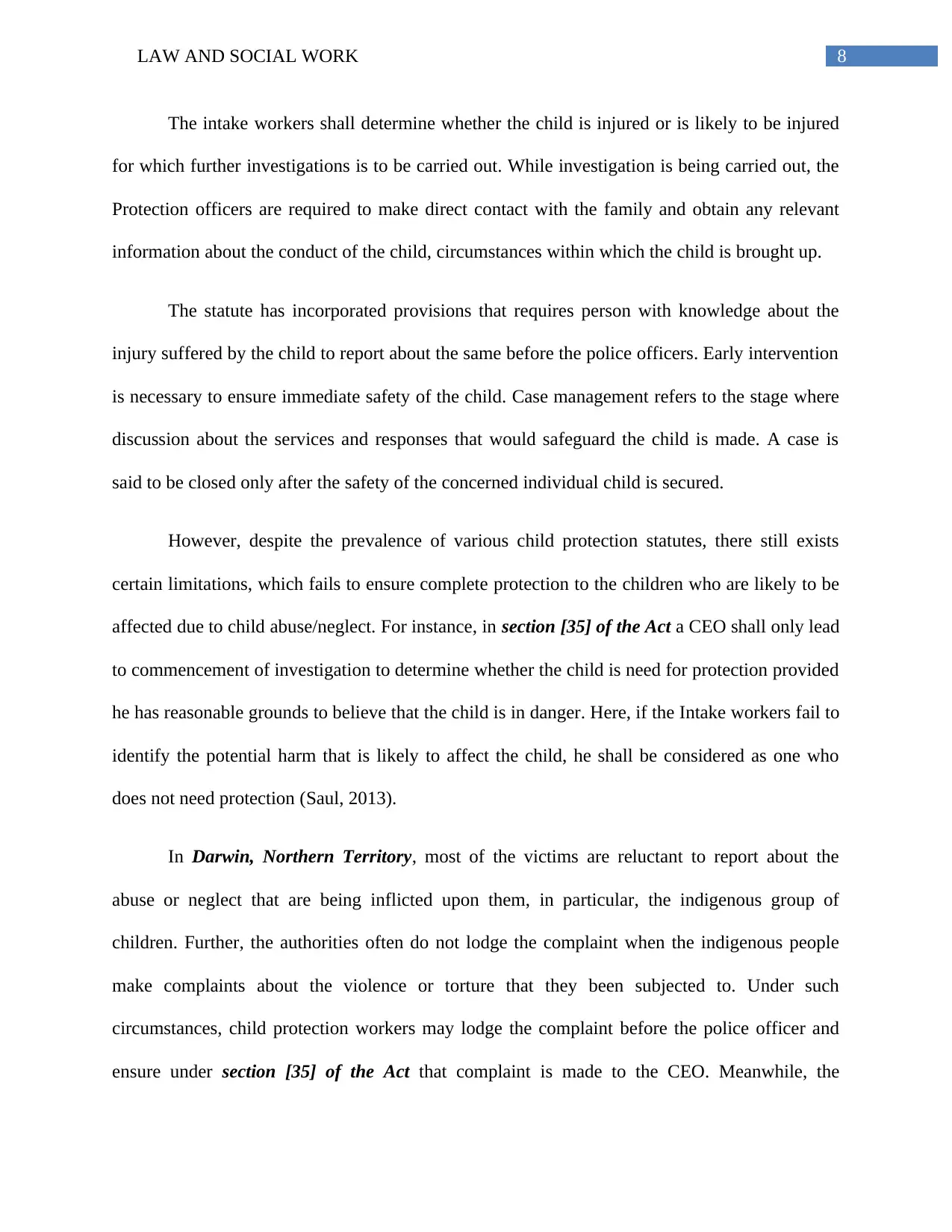
8LAW AND SOCIAL WORK
The intake workers shall determine whether the child is injured or is likely to be injured
for which further investigations is to be carried out. While investigation is being carried out, the
Protection officers are required to make direct contact with the family and obtain any relevant
information about the conduct of the child, circumstances within which the child is brought up.
The statute has incorporated provisions that requires person with knowledge about the
injury suffered by the child to report about the same before the police officers. Early intervention
is necessary to ensure immediate safety of the child. Case management refers to the stage where
discussion about the services and responses that would safeguard the child is made. A case is
said to be closed only after the safety of the concerned individual child is secured.
However, despite the prevalence of various child protection statutes, there still exists
certain limitations, which fails to ensure complete protection to the children who are likely to be
affected due to child abuse/neglect. For instance, in section [35] of the Act a CEO shall only lead
to commencement of investigation to determine whether the child is need for protection provided
he has reasonable grounds to believe that the child is in danger. Here, if the Intake workers fail to
identify the potential harm that is likely to affect the child, he shall be considered as one who
does not need protection (Saul, 2013).
In Darwin, Northern Territory, most of the victims are reluctant to report about the
abuse or neglect that are being inflicted upon them, in particular, the indigenous group of
children. Further, the authorities often do not lodge the complaint when the indigenous people
make complaints about the violence or torture that they been subjected to. Under such
circumstances, child protection workers may lodge the complaint before the police officer and
ensure under section [35] of the Act that complaint is made to the CEO. Meanwhile, the
The intake workers shall determine whether the child is injured or is likely to be injured
for which further investigations is to be carried out. While investigation is being carried out, the
Protection officers are required to make direct contact with the family and obtain any relevant
information about the conduct of the child, circumstances within which the child is brought up.
The statute has incorporated provisions that requires person with knowledge about the
injury suffered by the child to report about the same before the police officers. Early intervention
is necessary to ensure immediate safety of the child. Case management refers to the stage where
discussion about the services and responses that would safeguard the child is made. A case is
said to be closed only after the safety of the concerned individual child is secured.
However, despite the prevalence of various child protection statutes, there still exists
certain limitations, which fails to ensure complete protection to the children who are likely to be
affected due to child abuse/neglect. For instance, in section [35] of the Act a CEO shall only lead
to commencement of investigation to determine whether the child is need for protection provided
he has reasonable grounds to believe that the child is in danger. Here, if the Intake workers fail to
identify the potential harm that is likely to affect the child, he shall be considered as one who
does not need protection (Saul, 2013).
In Darwin, Northern Territory, most of the victims are reluctant to report about the
abuse or neglect that are being inflicted upon them, in particular, the indigenous group of
children. Further, the authorities often do not lodge the complaint when the indigenous people
make complaints about the violence or torture that they been subjected to. Under such
circumstances, child protection workers may lodge the complaint before the police officer and
ensure under section [35] of the Act that complaint is made to the CEO. Meanwhile, the
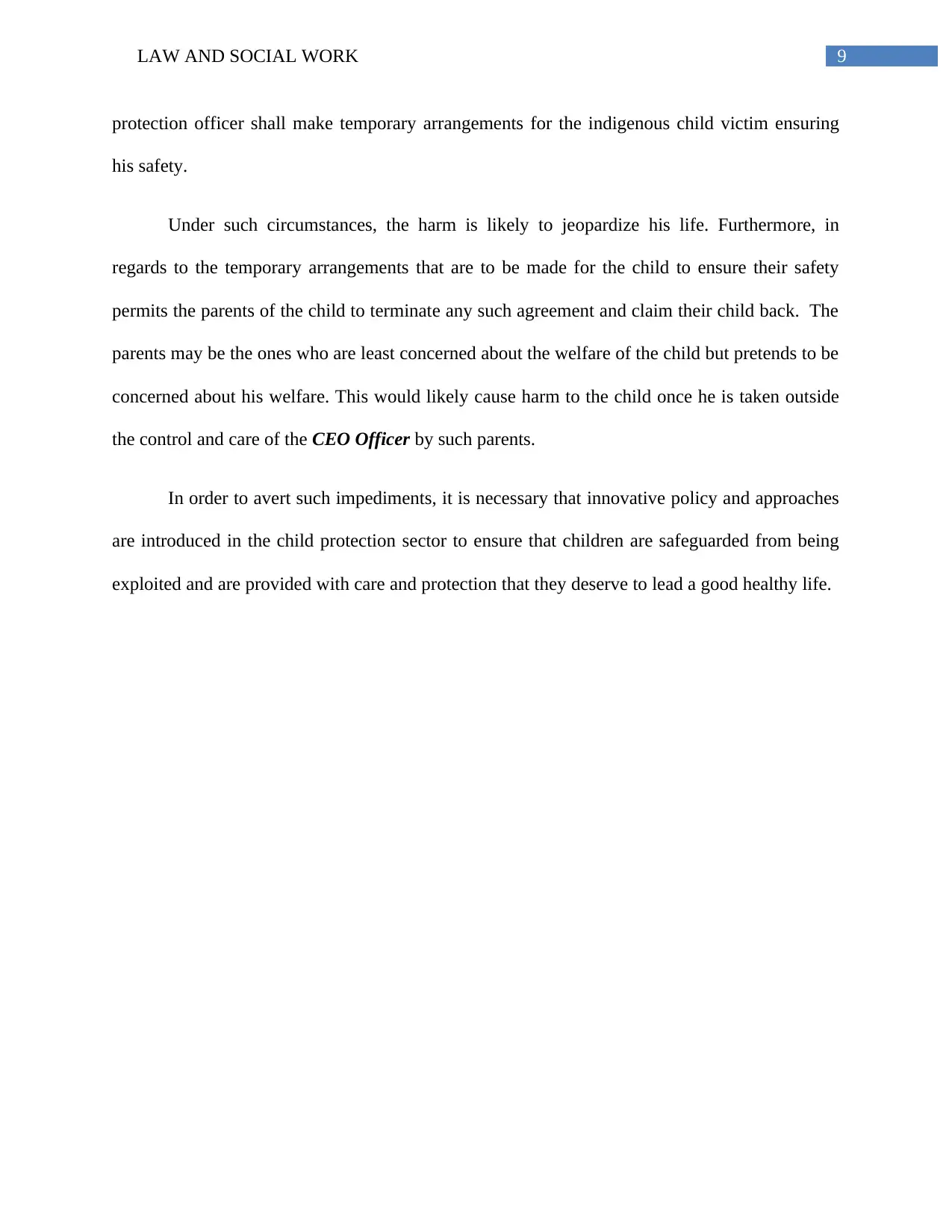
9LAW AND SOCIAL WORK
protection officer shall make temporary arrangements for the indigenous child victim ensuring
his safety.
Under such circumstances, the harm is likely to jeopardize his life. Furthermore, in
regards to the temporary arrangements that are to be made for the child to ensure their safety
permits the parents of the child to terminate any such agreement and claim their child back. The
parents may be the ones who are least concerned about the welfare of the child but pretends to be
concerned about his welfare. This would likely cause harm to the child once he is taken outside
the control and care of the CEO Officer by such parents.
In order to avert such impediments, it is necessary that innovative policy and approaches
are introduced in the child protection sector to ensure that children are safeguarded from being
exploited and are provided with care and protection that they deserve to lead a good healthy life.
protection officer shall make temporary arrangements for the indigenous child victim ensuring
his safety.
Under such circumstances, the harm is likely to jeopardize his life. Furthermore, in
regards to the temporary arrangements that are to be made for the child to ensure their safety
permits the parents of the child to terminate any such agreement and claim their child back. The
parents may be the ones who are least concerned about the welfare of the child but pretends to be
concerned about his welfare. This would likely cause harm to the child once he is taken outside
the control and care of the CEO Officer by such parents.
In order to avert such impediments, it is necessary that innovative policy and approaches
are introduced in the child protection sector to ensure that children are safeguarded from being
exploited and are provided with care and protection that they deserve to lead a good healthy life.
Secure Best Marks with AI Grader
Need help grading? Try our AI Grader for instant feedback on your assignments.
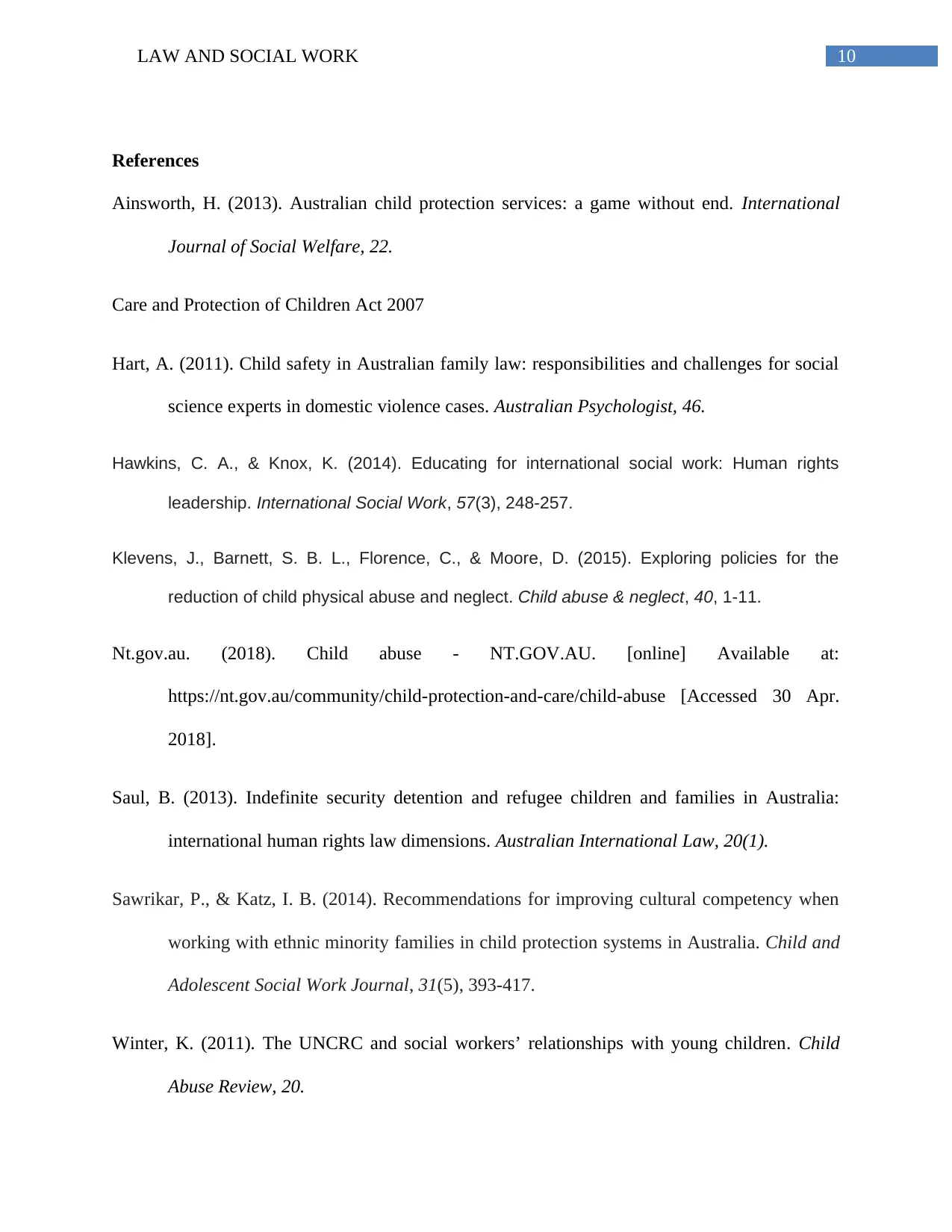
10LAW AND SOCIAL WORK
References
Ainsworth, H. (2013). Australian child protection services: a game without end. International
Journal of Social Welfare, 22.
Care and Protection of Children Act 2007
Hart, A. (2011). Child safety in Australian family law: responsibilities and challenges for social
science experts in domestic violence cases. Australian Psychologist, 46.
Hawkins, C. A., & Knox, K. (2014). Educating for international social work: Human rights
leadership. International Social Work, 57(3), 248-257.
Klevens, J., Barnett, S. B. L., Florence, C., & Moore, D. (2015). Exploring policies for the
reduction of child physical abuse and neglect. Child abuse & neglect, 40, 1-11.
Nt.gov.au. (2018). Child abuse - NT.GOV.AU. [online] Available at:
https://nt.gov.au/community/child-protection-and-care/child-abuse [Accessed 30 Apr.
2018].
Saul, B. (2013). Indefinite security detention and refugee children and families in Australia:
international human rights law dimensions. Australian International Law, 20(1).
Sawrikar, P., & Katz, I. B. (2014). Recommendations for improving cultural competency when
working with ethnic minority families in child protection systems in Australia. Child and
Adolescent Social Work Journal, 31(5), 393-417.
Winter, K. (2011). The UNCRC and social workers’ relationships with young children. Child
Abuse Review, 20.
References
Ainsworth, H. (2013). Australian child protection services: a game without end. International
Journal of Social Welfare, 22.
Care and Protection of Children Act 2007
Hart, A. (2011). Child safety in Australian family law: responsibilities and challenges for social
science experts in domestic violence cases. Australian Psychologist, 46.
Hawkins, C. A., & Knox, K. (2014). Educating for international social work: Human rights
leadership. International Social Work, 57(3), 248-257.
Klevens, J., Barnett, S. B. L., Florence, C., & Moore, D. (2015). Exploring policies for the
reduction of child physical abuse and neglect. Child abuse & neglect, 40, 1-11.
Nt.gov.au. (2018). Child abuse - NT.GOV.AU. [online] Available at:
https://nt.gov.au/community/child-protection-and-care/child-abuse [Accessed 30 Apr.
2018].
Saul, B. (2013). Indefinite security detention and refugee children and families in Australia:
international human rights law dimensions. Australian International Law, 20(1).
Sawrikar, P., & Katz, I. B. (2014). Recommendations for improving cultural competency when
working with ethnic minority families in child protection systems in Australia. Child and
Adolescent Social Work Journal, 31(5), 393-417.
Winter, K. (2011). The UNCRC and social workers’ relationships with young children. Child
Abuse Review, 20.

11LAW AND SOCIAL WORK
1 out of 12
Related Documents
Your All-in-One AI-Powered Toolkit for Academic Success.
+13062052269
info@desklib.com
Available 24*7 on WhatsApp / Email
![[object Object]](/_next/static/media/star-bottom.7253800d.svg)
Unlock your academic potential
© 2024 | Zucol Services PVT LTD | All rights reserved.





